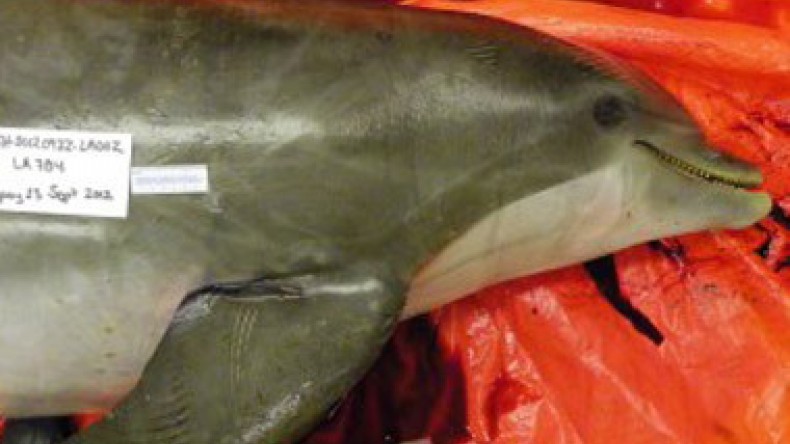
Race on to find Gulf Coast dolphin killers
Someone has turned a crucial dolphin birthing area off the U.S. Gulf Coast into a killing zone and the race is on to find the culprit or culprits before the marine mammals begin giving birth and the newborn dolphins are put at risk, CNN reported.
"There is a sense of urgency. It is important that we find the person or persons who is perpetrating this heinous act," said Moby Solangi, lead biologist of The Institute of Marine Mammal Studies in Gulfport, Mississippi.
"It looks like somebody is deranged. It's really senseless. It's repugnant. It's illegal. I don't understand what sort of person would do such a cruel act," Solangi told CNN during an aerial tour of the sites where many of the dolphin carcasses were found.
At least seven carcasses have turned up along a 120-mile stretch of the Gulf Coast, from Louisiana in the west to Florida in the east. Some have gunshot wounds, others have been mutilated, including one with its jaw cut off.
Solangi, who performed necropsies of all the slaughtered dolphins, said the cruelty of what he's seen is the equivalent of having your pet dog's neck sliced.
"This is gruesome really," Solangi said. "It's not only killing them, it's also mutilating them. And the parts that are taken are disposed of; not next to the animal, they are taken. And they are not worth anything."
The first dolphin was found January 8 with a bullet wound on Deer Island, near Biloxi, Mississippi. In June, a bottlenose dolphin was found in Perdido Bay, Florida, near the Florida-Alabama state line, with a screwdriver stuck in its head. In September, one was found on Elmers Island, Louisiana, with a gunshot wound. On October 10, a dolphin was found on the beach in Dauphin Island, Alabama with its fluke cut off.
The list gets worse from there.
On November 6, a dolphin was found in near Ocean Springs, Mississippi, dead from numerous cuts. Three days later two more were discovered; another one with bullet wounds near Ocean Springs, and one on Ship Island, a remote barrier island off Biloxi, Mississippi, that was found with its jaw cut off. Authorities are still trying to determine if a dead dolphin found November 2, in Bayou Julia, Louisiana, is linked to the other killings.
To stop the slaughter before the dolphins' birthing season, which begins soon, federal authorities say they need the public's help.
"We need to have witnesses come forward. We need public input and information," said Jeff Radonski, a deputy special agent for the National Oceanic and Atmospheric Administration, which is leading the hunt for the dolphin killer or killers.
Investigators hope the culprit has bragged to friends or acquaintances about the killings. The large area over which the carcasses have been found make the investigation more difficult, Radonski said.
There could be several motives for the slaughter -- it might be someone who is a "thrill seeker," or fishermen who found the dolphins interfering with their operations on the water, he explained.
In at least two previous cases, fishing charter captains have been found guilty of shooting at dolphins that approached their boats, or the fish their passengers had hooked, NOAA told CNN.
The Marine Mammal Protection Act states that anyone convicted of killing a dolphin could be sentenced to one year in prison and fined up to $100,000. The law also makes it a crime to feed dolphins in the wild.
Lt. Col. Claude Pittman, who patrols in the area of the killings for the Mississippi Department of Marine Resources, said he hasn't seen a dolphin shot in his 22 years of work. But these dolphin killings are making him fearful.
"You don't know what type of person is doing this," he said. "Would they carry it any further? I have no idea."
Newsfeed
Videos






























